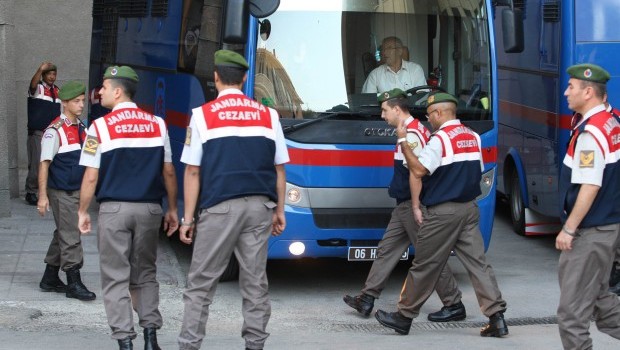
Turkish soldiers secure the area on September 2, 2013 as vehicles carrying detained Turkish army officers arrive at a courthouse in Ankara (AFP PHOTO / ADEM ALTAN)
Retired Gen. Ismail Hakki Karadayi, 81, and the other defendants—including military officials and civilians—face life in prison, if convicted of charges of “overthrowing the Turkish government by force” for pressuring former Prime Minister Necmettin Erbakan to resign.
The ouster was dubbed Turkey’s “post-modern coup” because unlike previous coups in Turkey, no tanks or soldiers were used to bring down the government which was replaced by another coalition nominated by the president.
Karadayi served as the chief of the military staff from 1994 to 1998, at a time when the army was concerned by Erbakan’s efforts to raise the profile of Islam in the predominantly Muslim but secular country. On Feb. 28, 1997, the military-dominated National Security Council threatened action if Erbakan did not back down. He resigned four months later.
Karadayi, who has denied playing a role in Erbakan’s ouster, did not attend Monday’s opening hearing on medical grounds. However, his deputy at the time, retired Gen. Cevik Bir, has said in his own defense that military officers had acted within the military’s chain of command.
The proceedings are expected to last several months.
Turkey’s military, which has long regarded its role as protector the country’s secular traditions, staged three other coups between 1960 and 1980.
Prime Minister Recep Tayyip Erdogan—whose ruling party splintered from Erbakan’s now-defunct Welfare Party and came to power in 2002—has curtailed the powers of the generals and has vowed to put an end to the era of coups in Turkey.
Last year, a court in Istanbul convicted nearly 330 army officers, including the former air force and navy chiefs, of plotting to bring down Erdogan’s government in 2003, and sentenced some to 20 years in prison. That case, however, has been marred by procedural flaws and long pre-trial detention periods. All of the defendants are appealing the verdict.
Earlier this month, scores of people—including another former military chief, politicians and journalists—were convicted of a separate plot to overthrow Erdogan’s government in 2003 and 2004, soon after it came to power.
Meanwhile, the two ailing previous leaders of the country’s military are also on trial for the 1980 coup that stopped deadly fighting between political extremists but also led to a wave of executions and torture in Turkey.
